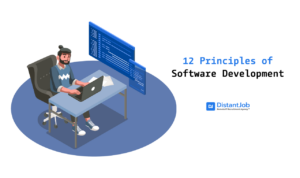When you’re in the hiring process for a tech role, semantics can have a huge impact on who applies to the job. Adding the word “coder” in your job ad will not have the same meaning as “programmer” because while both roles are key in software, web and app development, they have fundamental differences.
Coders focus on writing code following specific instructions and often involve more straightforward tasks. Programmers, on the other hand, tend to be involved in broader aspects of software development and in the implementation of complex systems.
Let’s explore more in-depth the key distinctions between a coder vs programmer, examining their respective responsibilities and industry perspectives, to understand which role aligns closely with your hiring aspirations.
What is a Coder?
A coder is a person who writes and implements code. Code writing focuses on translating the concepts and designs into functional programs. Coders have expertise in writing in programming languages that a computer converts into machine language to follow a code’s instructions.
The most common programming languages used by coders are Python, Java, HTML/CSS for web development and JavaScript and SQL for database management. The choice of the language boils down to the specific requirements of each project.
Usually coders are the least trained or experienced level of programmers. They do not have the same algorithm knowledge as programmers, as they often are focused on one coding language.
Coders Main Responsibilities and Tasks
Coders focus on four main tasks:
- Code Implementation – Coders work on translating the requirements and designs provided by others into functional code.
- Debugging and Testing – Coders engage in identifying and fixing bugs in existing code, getting involved in basic testing to make sure their code works.
- Maintenance – Coders handle the maintenance of existing software, updating code as needed and adapting to new requirements.
- Collaboration – Coders work under the guidance of more senior developers or project managers, collaborating with a team to ensure their code aligns with the overall project.
What is a Programmer?
A programmer is a professional in software development who is not only involved in writing code but also plays a relevant role in problem-solving, designing solutions and developing complex software systems.
To draw a comparison, think of coders as assembly line workers who follow predefined instructions and procedures to assemble products. Programmers, on the other hand, function more like engineers or architects. They not only construct the final product but also design the blueprint, make crucial decisions, and innovate throughout the development process, shaping the software’s unique architecture and functionality.
They are highly proficient in more than one programming language. The choice often depends on their particular interest and goals, but commonly, they demonstrate expertise in languages such as Python, Java, JavaScript, C++, C#, Ruby, PHP, SQL, Swift, Kotlin, Go (Golang) and Rust.
Programmers Main Responsibilities and Tasks
What are the typical responsibilities and tasks that top-tier programmers handle in their role?
- System Design and Analysis – Programmers are involved in the initial stages of a project, analyzing requirements and designing the architecture of the software system.
- Code Development – Like coders, they write code, but their work typically involves more complex algorithms and data structures.
- Problem-Solving and Debugging – Programmers have a key role in solving complex problems during the development process. They identify and fix bugs that may not be immediately apparent.
- Testing and Quality Assurance – They play a significant role in the testing phase, ensuring the software meets all specifications and quality standards.
- Maintenance and Optimization – Beyond initial development, programmers often manage the ongoing maintenance and enhancement of software, optimizing performance and adding new features.
- Project Management – Senior programmers might take on project management responsibilities, overseeing the development process and making high-level decisions about design and implementation.
Spotting Key Coding vs. Programming Differences
Despite both roles relying on the skill of coding, there are fundamental differences between coder vs. programmer in terms of their specific roles and responsibilities
Skills
Coders translate predefined requirements into functional code. Programmers not only code but they are also responsible for the overarching design and strategic planning in software development (Remember musician vs compositor.)
Below is a comparison table that outlines the distinctions between a coder and a programmer, highlighting their unique roles and responsibilities:
| Differences | Coder | Programmer |
| Main role | Their primary role is to write code. | Have a wider range of tasks that range from code writing to testing, deploying software, fixing errors, and project management tasks. |
| Technical skills | Use mostly text editor and a basic compiler software for testing their code. | Use tools such as modeling programs, code generators, databases, testing frameworks, code editors, compilers and tools to make in-depth analysis. |
| Project involvement | Focus on the coding aspect within a defined framework. | Have a broader and strategic role that encompasses the full scope of the development process. |
| Career paths | Coders can specialize in different programming languages, becoming developers or in areas like web development or database management. | Programmers have a broader range of career trajectories that involve design, development, and strategic planning. |
Education and Career Progression for Coders and Programmers
There are no specific steps to become a coder or programmer, as that path can take different forms. But generally, both roles start with a foundational education in computer science or related fields (through degrees, bootcamps, online courses or other self-taught methods), and programmers tend to have more advanced degree programs in computer science or software engineering.
Coders tend to focus on specific programming languages like Python, JavaScript or HTML/CSS. Programmers are proficient in diverse programming languages and have a deeper understanding of computer science fundamentals, algorithms, and data structures.
When it comes to career progression, here’s how it typically works for coders vs programmers:
Career Progression in Coders
- Entry-Level Positions: Initially, coders start in roles like Junior Developer or Web Developer, focusing on simpler coding tasks.
- Specialization: With experience, they can specialize in areas like front-end or back-end development, database management, etc.
- Advancing to Senior Roles: Over time, coders can become Senior Developers, leading coding projects or small teams.
- Transition Opportunities: Coders may also opt to transition into related roles such as Quality Assurance, Technical Writing, or even move towards programming with additional education and experience.
Career Progression in Programmers
- Starting Roles: Programmers usually start their careers as Software Developers, Systems Analysts, or Application Developers.
- Specialization: They can specialize in fields like Artificial Intelligence, Machine Learning, Systems Architecture, or Game Development.
- Senior Technical Roles: With experience, they can progress to roles such as Senior Developer, Team Lead, or Project Manager.
- Leadership and Strategic Positions: Advanced career options include becoming a Chief Technology Officer (CTO), Software Architect, or an independent consultant.
Industry Perspectives: How Should You Hire?
The demand for IT professional roles has doubled since 2020, and the software market is expected to continue growing at an annual rate of 6.5%.
With new technologies appearing in the landscape, businesses are in the continuous search for IT professionals such as coders and programmers. But, as explored through the article, these roles have distinctive differences that can impact the outcome of your project.
So, how do you know which one you should hire?
“Deciding between coders and programmers is simple. If you need a role focused on the “what” of the project – the implementation part, then coders are who you need. But if you are seeking someone who has experience in planning and designing software, then a broader role like programming is ideal”
– Sharon Koifman, Founder of DistantJob.
Simply put, coders implement while programmers create and oversee the entire development process.
Why Understanding the Difference Matters
Understanding the differences between coders vs programmers helps you recruit the right talent for your team, as you’re ensuring that the individuals you choose align with your needs and goals.
Here’s a brief test that can guide you in choosing the right person for the role.
Section 1: Hiring a Coder
- Is the primary need focused on writing and implementing code from specific instructions?
- Are the tasks relatively straightforward and clearly defined?
- Is your project short-term or part of a larger project requiring specific technical skills?
- Do you need someone to focus on coding without requiring them to engage in complex problem-solving or system design?
- Are you looking for someone to maintain and update existing systems rather than create new ones?
- Is there a set framework or environment in which the individual will work with minimal deviation?
Count your “Yes” answers in this section. If you have a majority of “Yes” responses here, a coder might be the right choice for your project.
Section 2: Hiring a Programmer
- Does your project require someone to design, plan, and oversee the entire software development process?
- Are complex problem-solving and the ability to develop algorithms essential for your project?
- Do you need someone who can work on a project from conception to completion, including post-deployment activities?
- Is the project innovative or requires creative input in terms of software design and functionality?
- Will the role involve strategic decision-making and potentially leading a team?
- Do you require someone with a deep understanding of multiple programming languages and software architecture?
- Are you looking for a long-term team member who can adapt and evolve with the project’s needs?
Count your “Yes” answers in this section. If most of your answers in this section are “Yes”, then hiring a programmer would be more suitable for your project.
Final Thoughts: Choosing the Right Professional
The terms “coder” and “programmer” are often used interchangeably but are key to understanding when starting your hiring process, as you’ll have different applicants.
Coders primarily focus on writing and implementing code based on specific instructions, while programmers tackle complex problem-solving, develop algorithms and are often responsible for the lifecycle of a project.
In order to choose between a coder or a programmer, you need to consider what are the specific needs of your project. If it’s for executing specific tasks, a coder is likely the right choice. But if your project demands a more holistic approach, then a programmer is more suitable.
We hope this practical guide has helped you define which professional you need for your project. And if you already know who to hire, contact us. At DistantJob, we can support you through the entire hiring process, from headhunting and evaluation to onboarding and ongoing support. Want to know more? Let’s talk!



